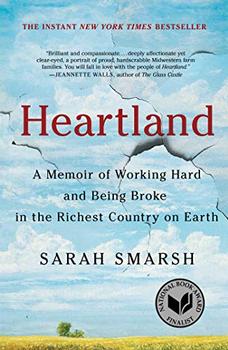Summary | Excerpt | Reading Guide | Reviews | Beyond the Book | Readalikes | Genres & Themes | Author Bio

A Memoir of Working Hard and Being Broke in the Richest Country on Earth
by Sarah Smarsh
"It wasn't like when you lived in town, you'd bebop down to the QuikTrip," she told me years later.
She learned to keep the basement overstocked with discount canned food, the deep-freeze packed with every cut of meat, the cupboards filled with double-coupon deals. She and Arnie were the sort of poor who, whether by spirit or circumstance, found a way to feed themselves and whoever else needed a meal.
Betty's city friends drove west to see her new country life. Arnie's friends showed up to see his wild city woman. They partied at Cheney Lake, a few miles away along straight dirt roads and a curving two-lane blacktop. They fished and swam in Arnie's pond with its water snakes and leeches, the crusty earthen dam dimpled where cow hooves had sunk in mud after rain. They camped next to fires in pastures with hot dogs, Coors, and s'mores. They drove mopeds through fields and crashed three-wheelers into trees. They had butchering parties in the detached wooden garage that housed a meat grinder, a sink, hooks hanging from rafters, and a bloodstained cement floor. Everyone got drunk enough to eat mountain oysters, and everyone who helped went home with a cooler of meat wrapped in white paper. They laughed when a pile of aluminum cans brought five times its worth at the scrap lot after Arnie, pulling them in a net behind his tractor, inadvertently filled the cans with sand and tipped the weight scales.
During one liquor-store run to Kingman, after skidding across an icy country bridge and rolling down an embankment in a small Toyota, Betty made her younger sister Pud mad by lighting a cigarette inside the upside-down car while she thought about how to get out. Pud named the place Camp Fun Farm.
It wasn't long before Pud's older daughter, Candy, moved into the farmhouse to escape some sorry situation. Next came Pud herself and er younger daughter, Shelly, after the inevitable divorce. Thus began a nearly thirty-year stretch of Betty's nomadic, cash-strapped family members taking refuge there by necessity.
When Betty wasn't cooking for people at the farm, she was working at the courthouse in Wichita. Or she was pulling weeds in the vegetable garden east of the house, cleaning, planting flowers, or digging for tools on the back porch that housed the washer and dryer and shotguns.
Betty was only ten years older than Arnie's firstborn, a surly, long-haired twenty-something who was often drunk. During the summer, he played on a slow-pitch softball team of area farm boys who liked to drink beer at Arnie's farm after games. One of them was Nick Smarsh.
That's how teenage Jeannie met Nick, the farmer and carpenter who would be my dad. He had grown up working the fields and hammering roofs in hot sun and cold wind. In the summer, his thick arms were tanned a deep red-brown, darker than the brown in his plaid snap-up shirts with the sleeves cut off. He drove a white 1966 Chevy Caprice, which he kept clean as a whistle inside and out, with air shocks lifting the back end. Sometimes he shot road signs through pickup windows.
He was always smiling, though, never critical or violent, unlike so many of the men she'd known. Nick turned out to be the one thing Jeannie didn't mind about the country.
Even though Arnie wasn't my blood relation, he played that big a role in my life—Jeannie and Nick never would have met if Arnie hadn't asked Betty to two-step. He was such a bright light for us that, after he died, it occurred to me that I would call you after his middle name: August. I knew you were a girl, but I never thought to make it Augustine. Your name was August.
It was a special name in that Grandpa Arnie and I were both born that month. The same sign, my mom would want me to point out. Grandpa and I used to butt heads something awful when I was in high school. That happens between teenagers and their family regardless of their birthdays. But I'd find out years later that he did see something of himself in me—a point he never would have told me himself and a sure recipe for friction. I wonder now whether he might have been hard on me as I got older because he was sad knowing that I was about to leave the farm.
Excerpted from Heartland by Sarah Smarsh. Copyright © 2018 by Sarah Smarsh. Excerpted by permission of Scribner. All rights reserved. No part of this excerpt may be reproduced or reprinted without permission in writing from the publisher.
There are two kinds of light - the glow that illuminates, and the glare that obscures.
Click Here to find out who said this, as well as discovering other famous literary quotes!
Your guide toexceptional books
BookBrowse seeks out and recommends the best in contemporary fiction and nonfiction—books that not only engage and entertain but also deepen our understanding of ourselves and the world around us.